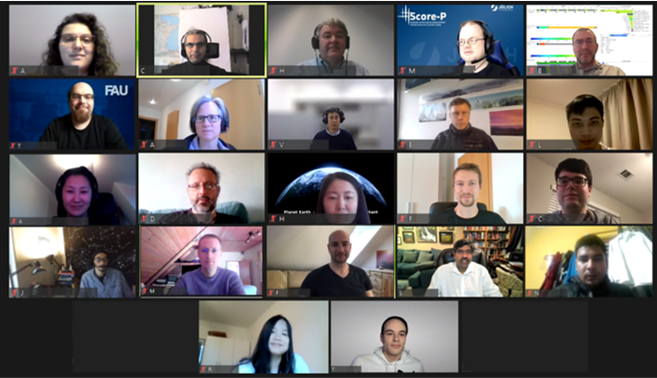37th VI-HPS Tuning Workshop (CSC, Frankfurt, Germany) - Online
Date
Monday 07th - Friday 11th December 2020
Location
The workshop will be held online, using the Zoom platform.
Organising Institutions
Goals
This workshop organised by VI-HPS, HKHLR, CSC Goethe University Frankfurt and UVSQ will:
- give an overview of the VI-HPS programming tools suite
- explain the functionality of individual tools, and how to use them effectively
- offer hands-on experience and expert assistance using the tools
On completion participants should be familiar with common performance analysis and diagnosis techniques and how they can be employed in practice (on a range of HPC systems). Those who prepared their own application test cases will have been coached in the tuning of their measurement and analysis, and provided optimization suggestions.
Programme Overview
Presentations and hands-on sessions are planned on the following topics:
- Setting up, welcome and introduction
- TAU performance system
- MAQAO performance analysis & optimisation
- Score-P instrumentation and measurement
- Scalasca automated trace analysis
- Vampir interactive trace analysis
- Likwid performance tool suite
- PAPI hardware performance counters
- Extra-P automated performance modeling
- ... and potentially others to be added
A brief overview of the capabilities of these and associated tools is provided in the VI-HPS Tools Guide.
The workshop will be held in English and run from 09:00 to not later than 18:00 each day, with breaks.
Participants are encouraged to prepare their own MPI, OpenMP and hybrid MPI+OpenMP parallel application codes for analysis. Codes using multiple GPUs via OpenACC, OpenCL or CUDA may also be analysed.
Programme in Detail (provisional) - all times given as CET (UTC+1)
| Day 1: | Monday 07 December | |
| 09:00 | Welcome [Anja Gerbes, CSC & Cédric Valensi, UVSQ]
|
|
| 10:30 | (break) | |
| 11:00 | MAQAO performance analysis tools [Jäsper Ibnamar & Emmanuel Oseret, UVSQ] | |
| 12:30 | (lunch) | |
| 14:00 | Hands-on coaching to apply MAQAO to analyze participants' own code(s). | |
| 15:30 | (break) | |
| 16:00 | ||
| 17:30 | Schedule for remainder of workshop | |
| 18:00 | (adjourn) | |
| Day 2: | Tuesday 08 December | |
| 09:00 | PAPI hardware performance counters [Frank Winkler, UTK]
|
|
| 10:30 | (break) | |
| 11:00 | LIKWID performance tool suite [Thomas Gruber, FAU]
|
|
| 12:30 | (lunch) | |
| 14:00 | Hands-on coaching to apply LIKWID to analyze participants' own code(s). | |
| 15:30 | (break) | |
| 16:00 | Hands-on coaching to apply TAU to analyze participants' own code(s). | |
| 17:30 | Schedule for remainder of workshop | |
| 18:00 | (adjourn) | |
| Day 3: | Wednesday 09 December | |
| 09:00 | Score-P instrumentation & measurement toolset [Marc Schlütter, JSC]
|
|
| 10:30 | (break) | |
| 11:00 | Score-P specialized instrumentation and measurement [Marc Schlütter & Brian Wylie, JSC]
|
|
| 12:30 | (lunch) | |
| 14:00 | Hands-on coaching to apply Score-P/CUBE to analyze participants' own code(s). | |
| 15:30 | (break) | |
| 16:00 | Hands-on coaching to apply TAU to analyze participants' own code(s). | |
| 17:30 | Review of day and schedule for remainder of workshop | |
| 18:00 | (adjourn) | |
| Day 4: | Thursday 10 December | |
| 09:00 | Scalasca automated trace analysis [Markus Geimer, JSC]
|
|
| 10:30 | (break) | |
| 11:00 | Vampir interactive trace analysis [William Williams, TUDresden]
|
|
| 12:30 | (lunch) | |
| 14:00 | Hands-on coaching to apply Scalasca/Vampir to analyze participants' own code(s). | |
| 15:30 | (break) | |
| 16:00 | Hands-on coaching to apply tools to analyze participants' own code(s). | |
| 17:30 | Review of day and schedule for remainder of workshop | |
| 18:00 | (adjourn) | |
| Day 5: | Friday 11 December | |
| 09:00 | Extra-P automated performance modeling [Marcus Ritter, TUDarmstadt]
|
|
| 10:30 | (break) | |
| 11:00 | Hands-on coaching to apply tools to analyze participants' own code(s). | |
| 12:30 | (lunch) | |
| 14:00 | Hands-on coaching to apply tools to analyze participants' own code(s). | |
| 16:00 | (adjourn) |
Hardware and Software Platforms
Goethe-HLR: 412 nodes with Intel Xeon Skylake Gold 6148 and 192GB RAM, with EDR and FDR InfiniBand interconnects and a parallel scratch filesystem with a capacity of 2.4 PB and an aggregated bandwidth of 27 GB/s.
The local HPC system Goethe-HLR is the primary platform for the workshop and will be used for the hands-on exercises. Course accounts will be provided during the workshop to participants without existing accounts. Other systems where up-to-date versions of the tools are installed can also be used when preferred, though support may be limited and participants are expected to already possess user accounts on non-local systems. Regardless of whichever external systems they intend to use, participants should be familiar with the relevant procedures for compiling and running their parallel applications (via batch queues where appropriate).
Registration
Register via the course website.
Contact
Tuning Workshop SeriesUniversité de Versailles Saint-Quentin-en-Yvelines Phone: +33 1 77 57 59 36 Email: cedric.valensi[at]uvsq.fr |
Local ArrangementsGoethe University Frankfurt, Center for Scientific Computing (CSC) Phone: +49 (0)69 798-47356 Email: gerbes[at]csc.uni-frankfurt.de |





